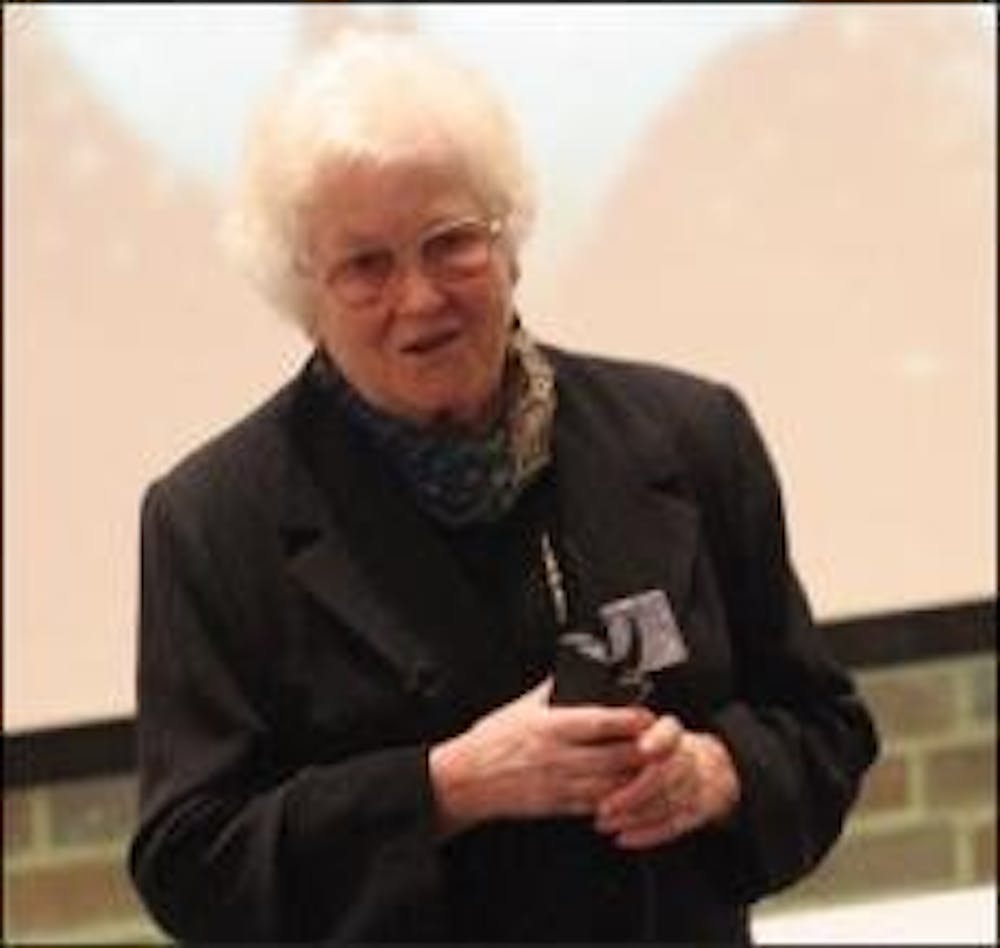
Judith Meisel speaks to students about her Holocaust experience in Shideler Hall Thursday.
In 1944, Judith Meisel watched as her mother disappeared behind a door in the Stutthof concentration camp. She would never see her again.
Now, 64 years later, Meisel stood in Miami University's Shideler Hall, screening her documentary about her own Holocaust experiences, Tak for Alt - Danish for "Thanks for Everything."
"The story of the Holocaust is a story of hate," said Amy Greenbaum, director of Hillel at Miami. "And unfortunately it's not even a story of extreme hate. It's a story of how a little bit of hate and a little bit of intolerance can turn into an extreme situation."
As the documentary explains, 12-year-old Meisel and her family were forced from their home in Yasvene, Lithuania and, along with other Jews, confined to the Kovno ghetto, the largest ghetto in Lithuania. Her family and six other families shared a small apartment-style residence.
Three years later, the group was relocated by train to the Stutthof concentration camp. There, her mother and thousands of others would die at the hands of their Nazi captors. When Meisel was finally liberated May 5, 1945, she was 16 years old and weighed 47 lbs.
According to Meisel, among the most disturbing aspects of Nazi Germany was the extreme apathy.
"I can deal with hate," Meisel said. "I know what hate is. But I cannot deal with the apathy and indignance."
Meisel said that although the violence of the Holocaust was perpetrated by individuals, the world as a whole bears the blame since no action was taken to prevent or stop it.
"God did not create Auschwitz," Meisel said. "Auschwitz was created by man."
Meisel said that after her experiences in Nazi-controlled Europe, she felt it was her responsibility to work actively in the United States. In those turbulent years of racial discrimination and violence, Meisel worked to register black voters and crossed angry mobs to welcome black families to her suburban Philadelphia neighborhood.
Enjoy what you're reading?
Signup for our newsletter
Now, Meisel speaks her opinion on current world issues including the violence in Darfur and the corruption of the Chinese government.
"I am very upset with the Olympic committee-that they gave the Olympics to China," Meisel said. "We can't tell countries how to live. But at the same time, we have to show them what human beings are."
Sarah Weiss, director of the Center for Holocaust and Humanity Education in Cincinnati, said that Meisel's experiences provide lessons that still bear value.
"We must not only teach the history, we must teach what that means today," Weiss said.
Junior Jennifer Tucker, Meisel's granddaughter, said that even though she has grown up hearing her grandmother's stories, her experiences still provide motivation today.
"Hearing her just got me so motivated to go out and do more," Tucker said. "I think it's so important for all these college students to go out, because when you're in a large group-even though a lot of people are extremely apathetic-it's also easier to do something because it's a large group."
Though several departments and organizations helped to bring Meisel to Miami, Hillel, The Center for American and World Cultures and the Center for Holocaust and Humanity Education spearheaded the effort.




